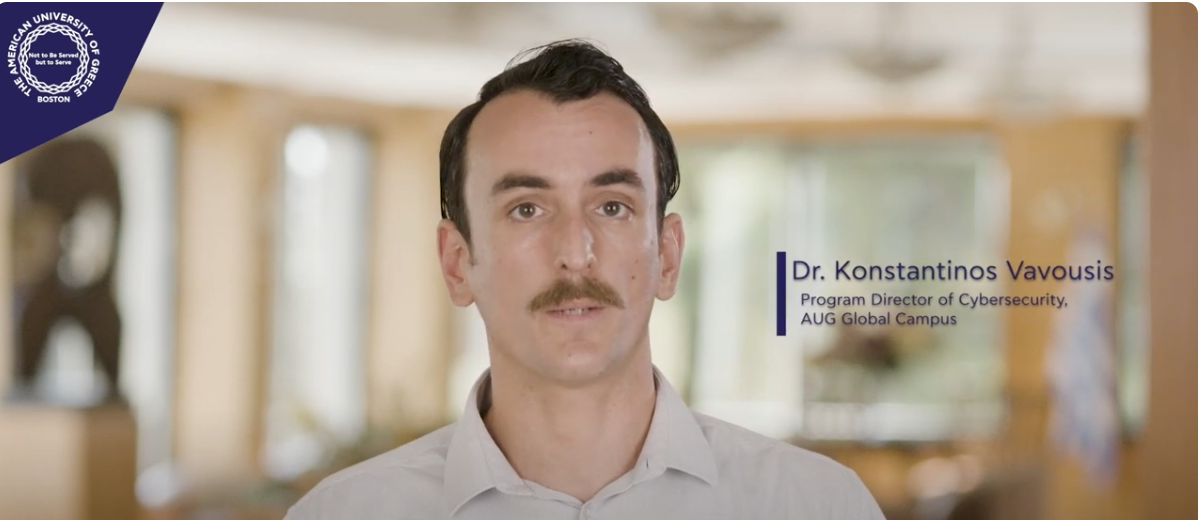
MS in Cybersecurity
GRADUATE
MS in Cybersecurity
.jpg)
$10,000 All-In MS in Cybersecurity
Full tuition is $10,000
Complete your degree in 15 months
Earn your degree fully online with a global faculty of industry experts — no GRE and no application fee required.
Earn your MS in Cybersecurity 100% online from The American University of Greece Global Campus (AUGGC). This 33-credit program prepares you to protect critical infrastructure, respond to evolving cyber threats, and lead with both technical and strategic expertise. Designed for early- and mid-career professionals, the program balances flexibility with real-world skills demanded in today’s job market.
- Duration: One year (full-time) or up to three years (part-time).
- Number of Courses: 11 courses (33 US credits).
- Course Delivery: 100% online
- Admission points: New students are admitted at the start of the fall, winter and spring terms.

Welcome to the MS in Cybersecurity at The American University of Greece Global Campus.
We live in a time when digital innovation drives progress across every industry—but also introduces new vulnerabilities and evolving threats. The demand for highly skilled cybersecurity professionals who can lead with both technical expertise and strategic insight has never been greater.
Our fully online MS in Cybersecurity is designed to meet this need by preparing forward-thinking professionals to protect digital infrastructures, manage risk, and lead with confidence in complex organizational environments. What sets this program apart is its interdisciplinary, business-friendly approach. We go beyond technical training to help you understand how cybersecurity decisions impact real-world systems—from corporate environments to critical public services.
Our faculty includes leading experts from across Europe and the world, each bringing hands-on experience and research in areas such as ethical hacking, cloud infrastructure, digital forensics, and cybersecurity management. You’ll engage with a practical, flexible curriculum rooted in real-world applications, industry standards, and ethical frameworks.
Whether you’re advancing your current career or transitioning into the cybersecurity field, this program offers the knowledge, tools, and global perspective you need to succeed.
I invite you to join us—and become part of the next generation of cybersecurity leaders.
Warm regards,
Dr. Konstantinos Vavousis
Program Director, MS in Cybersecurity
AUG Global Campus
Term 1: Foundations of Cybersecurity
In the first term, students are introduced to the core concepts of cybersecurity, including network protocols, vulnerabilities, and cloud infrastructure. Students will also gain hands-on experience in operating systems and digital forensics. The courses are designed to establish a strong foundation in both the theoretical and practical aspects of cybersecurity.
· Network Protocols Vulnerabilities & Cloud Infrastructures -Learn about key vulnerabilities in network protocols and cloud infrastructures and understand how to secure these critical systems.
· Operating Systems & Lab Environments - Gain practical experience in managing operating systems and learn to troubleshoot and secure systems in various lab environments.
· Digital Forensics & Computer Analysis - Understand the techniques of digital forensics and computer analysis, including the tools and methodologies used to investigate cybercrimes.
· Penetration Testing & Ethical Hacking - Dive into penetration testing techniques and ethical hacking practices, learning to identify vulnerabilities in systems before malicious attackers can exploit them.
Term 2: Advanced Cybersecurity Concepts
The second term dives deeper into specialized areas of cybersecurity, including cryptography, advanced offensive strategies, and compliance regulations. Students will gain the technical and legal expertise necessary to address complex cybersecurity challenges in today's digital landscape.
· Applied Cryptography - Study cryptographic techniques used to protect data in transmission and storage, including encryption methods and key management practices.
· Advanced Cyber Offensive Strategies - Build on the foundational knowledge from Term 1 with advanced penetration testing techniques. This course includes practical labs and real-world attack simulations.
· Law & Compliance in Cybersecurity - Explore the legal aspects of cybersecurity, including privacy laws, regulatory compliance, and best practices for ensuring organizational security, focusing on global compliance frameworks such as GDPR, PCI-DSS and HIPAA.
Term 3: Emerging Trends and Final Project
In the final term, students will tackle cutting-edge topics in cybersecurity, such as the use of artificial intelligence in security and advanced intrusion detection systems. The program culminates with a capstone project or thesis, allowing students to apply their knowledge to a real-world cybersecurity challenge.
· Risk Assessment & Cybersecurity Policies - This course enhances students’ understanding of the essential elements of risk assessment and the creation of effective cybersecurity policies for companies and organizations.
· Artificial Intelligence in Cybersecurity - Learn about the role of AI in detecting and preventing cyber threats, and explore the future potential of AI in cybersecurity defense strategies.
· Intrusion Detection & Incident Response - Study the techniques used to detect intrusions and respond to cyber incidents, including real-time monitoring, threat detection, and incident management.
· Capstone/Thesis
Apply your knowledge to a real-world cybersecurity project or research thesis. The capstone project provides an opportunity to showcase your skills and contribute to the field.
What Will You Learn?
1. Network Protocols Vulnerabilities & Cloud Infrastructures
2. Operating Systems & Lab Environments
3. Digital Forensics & Computer Analysis
4. Penetration Testing & Ethical Hacking
5. Applied Cryptography
6. Law & Compliance in Cybersecurity
7. Artificial Intelligence in Cybersecurity
8. Intrusion Detection & Incident Response
9. Advanced Cyber Offensive Strategies
10. Risk Assessment & Cybersecurity Policies
- Cybersecurity Strategy & Governance
- Develop and apply strategic cybersecurity frameworks to manage enterprise risks, align with business objectives, and ensure compliance with global standards and regulations.
- Network Security & Infrastructure Protection
- Evaluate and secure network systems, cloud environments, and critical infrastructures using best practices in network architecture, monitoring, and threat mitigation.
- Threat Analysis & Incident Response
- Identify, analyze, and respond to cyber threats and incidents using contemporary tools, ethical hacking techniques, and digital forensics methodologies.
- Security Risk Management & Policy Development
- Assess organizational security risks and design robust, policy-based mitigation plans that incorporate business continuity, access control, and regulatory compliance.
- Ethical & Legal Considerations in Cybersecurity
- Navigate ethical dilemmas and legal obligations in cybersecurity, demonstrating awareness of global data protection laws and professional codes of conduct.
- Secure Systems Design & Software Assurance
- Apply secure design principles to software, applications, and systems throughout the development lifecycle to prevent vulnerabilities and reduce attack surfaces.
- Communication & Leadership in Cybersecurity
- Communicate complex cybersecurity issues clearly to diverse stakeholders and lead multidisciplinary teams in implementing effective security strategies.
- Applied Research & Professional Development
- Conduct evidence-based research and apply emerging technologies, trends, and best practices to support continuous learning and professional growth in the cybersecurity field.
The American University of Greece Global Campus (AUGGC) is proudly accredited by the New England Commission of Higher Education (NECHE) and authorized by the Massachusetts Board of Higher Education. As an international institution from a financial aid perspective, AUGGC students are not eligible for U.S. federal financial aid. However, we are committed to making high-quality, globally recognized education accessible and affordable.
$10,000 Tuition
33 Credits at $303/credit
Complete in 15 - 24 months
Our base tuition is highly competitive by North American standards, and we encourage students to explore a variety of funding options, including private loans, employer tuition benefits, and other financial resources.
Our admissions team is available to discuss payment plans and help you identify the best options for making your education at AUGGC a reality.
See here for more information: Paying for Your Education.
The MS in Cybersecurity is designed for early- to mid-career professionals who are looking to build or transition into a career in cybersecurity, digital infrastructure protection, or information security management.
Ideal candidates include:
- STEM or IT graduates seeking advanced specialization in cybersecurity
- Professionals in tech-adjacent fields (e.g., engineering, systems analysis, telecommunications) aiming to pivot toward cybersecurity roles
- IT managers and network administrators expanding their knowledge in risk management, cloud security, and incident response
- Career changers with foundational technical skills looking to break into the cybersecurity domain
Aspiring leaders in public or private sectors who want to understand cybersecurity from both a technical and strategic perspective
Key characteristics:
- Strong analytical and critical thinking skills
- Interest in ethical hacking, digital forensics, and cyber risk governance
- Motivation to lead and secure complex digital systems
- Comfort with technology and willingness to engage in hands-on, practical learning
Whether you’re working in tech, business, or government—or entering the cybersecurity field for the first time—the program is structured to support flexible, applied learning for professionals across the globe.
- Cybersecurity Analyst: $70,000 – $110,000
- Information Security Manager: $95,000 – $145,000
- Network Security Engineer: $85,000 – $130,000
- Ethical Hacker / Penetration Tester: $80,000 – $120,000
- Cybersecurity Consultant: $90,000 – $140,000
- Digital Forensics Specialist: $75,000 – $115,000
- Cloud Security Architect: $110,000 – $160,000
- IT Risk & Compliance Analyst: $75,000 – $125,000
- Chief Information Security Officer (CISO): $150,000 – $250,000+ (with experience)
Admission Requirements for Graduate Programs
At the American University of Greece Global Campus, we consider a student’s lived experience.
Admission is open to individuals who demonstrate basic proficiency in relevant areas through formal education, professional experience or alternative verifiable means such as relevant courses and/or certifications. Applicants are expected to have:
- Basic Programming Skills –demonstrated through a certificate or proven proficiency during an interview.
- Foundational Knowledge in Networking—evidence by a networking course or equivalent practical experience.
- Introductory-level IT experience—such as internships, research placements, or other hands-on exposure to computing, cybersecurity, or software environments.
- General Proficiency with Operating Systems and Standard IT tools.
The admissions requirements below are guidelines.
The minimum graduate admission requirements are:
1. A bachelor’s degree in any discipline from an accredited institution with an average G.P.A. of 3.0 or better.
- Applicants who do not meet the minimum criteria may be admitted to the program on conditional status if the institution perceives other strengths in their application (e.g., strong research or relevant work experience, or other outstanding achievements during the applicants’ undergraduate experience).
2. Motivation to undertake graduate-level study and work to also be determined by:
- Two recommender’s contact information
- A personal statement of approx. 500 words submitted with the application form
- An interview is optional and under the discretion of the Admissions Committee
4. English Proficiency Requirement for Admission
The American University of Greece (AUG) Global Campus delivers all programs in English. To ensure student success in an online learning environment, applicants whose primary language is not English must demonstrate English proficiency through one of the following pathways:
- 1. Standardized English Language Tests
- Applicants may submit official test scores meeting or exceeding the following minimum requirements:
- TOEFL iBT: 87
- IELTS Academic: 6.5
- Duolingo English Test: 125
- PTE Academic: 59
- Cambridge/Michigan/MSU English: Proficiency
- Official test scores must be no more than two years old.
- 2. Previous Education in English
- Applicants may be exempt from submitting test scores if they have completed:
- A bachelor’s degree (or equivalent) from an accredited institution where English was the primary language of instruction.
- At least two years of full-time secondary or postsecondary education in an English-speaking country or an institution where English is the primary language of instruction.
- Applicants must provide official transcripts and, if necessary, documentation from the institution confirming English as the language of instruction.
Additional Considerations:
- AUG Global Campus reserves the right to request an interview to further assess English proficiency.
- Applicants who have completed international curricula such as the International Baccalaureate (IB) or British A-Levels in English may also qualify for an exemption.
- For applicants who do not meet the minimum scores but are close, a case-by-case review may be conducted, particularly for those with strong academic backgrounds.
5. Identification in the form of: Birth Certificate or Passport (to determine scholarship level where applicable)
6. Completed online application
Note: American University of Greece Global Campus is not eligible for the United States of America Federal Aid.
AI vs. AI: The Cybersecurity Arms Race
What We Teach at AUGGC
- Ethical Hacking & AI threat modeling
- Machine learning for anomaly detection
- Simulated red/blue team exercises using AI agents
- Deep discussions on digital ethics and AI governance
Faculty Spotlight



